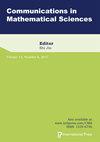Improved uniform error bounds of an exponential wave integrator method for the Klein–Gordon–Schrödinger equation with the small coupling constant
IF 1.3
4区 数学
Q2 MATHEMATICS, APPLIED
引用次数: 0
Abstract
Recently, the long-time numerical simulation and error analysis of PDEs with weak nonlinearity (or small potentials) become an interesting topic. However, the existing results of long-time error analysis mostly focus on the single equations. In this paper, for the Klein–Gordon–Schrödinger equation (KGSE) with a small coupling constant $\varepsilon \in (0,1]$, we propose an exponential wave integrator Fourier pseudo-spectral (EWIFP) method by reformulating the KGSE into a coupled nonlinear Schrödinger system (CNLSS). Through careful and rigorous analysis, we establish improved error bounds for the numerical solution at $O(h^m + \varepsilon \tau^2)$ in the long-time domain up to $O(1/\varepsilon)$ where $m$ is determined by the regularity conditions, h is the mesh size and τ is the time step, respectively. Compared with the existing results, our analysis shows the long-time errors of numerical solution for the KGSE. In error analysis, in addition to the classical tools such as energy method and cut-off technique, we also adopt the regularity compensation oscillation (RCO) technique which has been developed recently to analyze the accumulation of errors carefully. The numerical experiments support our error estimates and demonstrate the long-term stability of discrete mass and energy. To the best of our knowledge, there has not been any relevant long-time error analysis for the KGSE and any improved uniform error bounds for an exponential wave integrator. Our work is novel and provides a reference for analyzing the improved error bounds of the numerical methods for other coupled equations.具有小耦合常数的克莱因-戈登-薛定谔方程指数波积分器方法的改进均匀误差边界
近来,弱非线性(或小势)PDE 的长时间数值模拟和误差分析成为一个有趣的课题。然而,现有的长时间误差分析结果大多集中在单方程上。本文针对具有小耦合常数 $\varepsilon \in (0,1]$ 的克莱因-哥顿-薛定谔方程(KGSE),提出了一种指数波积分器傅立叶伪谱(EWIFP)方法,将 KGSE 重构为耦合非线性薛定谔系统(CNLSS)。通过细致严谨的分析,我们建立了改进的数值解误差边界,在长时域中为$O(h^m + \varepsilon \tau^2)$,最高为$O(1/\varepsilon)$,其中$m$由正则条件决定,h为网格大小,τ为时间步长。与现有结果相比,我们的分析表明了 KGSE 数值解的长期误差。在误差分析中,除了能量法和截断技术等经典工具外,我们还采用了近年来发展起来的正则补偿振荡(RCO)技术来仔细分析误差的累积。数值实验支持了我们的误差估计,并证明了离散质量和能量的长期稳定性。据我们所知,目前还没有针对 KGSE 的相关长期误差分析,也没有针对指数波积分器的改进均匀误差边界。我们的工作很新颖,为分析其他耦合方程数值方法的改进误差边界提供了参考。
本文章由计算机程序翻译,如有差异,请以英文原文为准。
求助全文
约1分钟内获得全文
求助全文
来源期刊
CiteScore
1.70
自引率
10.00%
发文量
59
审稿时长
6 months
期刊介绍:
Covers modern applied mathematics in the fields of modeling, applied and stochastic analyses and numerical computations—on problems that arise in physical, biological, engineering, and financial applications. The journal publishes high-quality, original research articles, reviews, and expository papers.

 求助内容:
求助内容: 应助结果提醒方式:
应助结果提醒方式:


